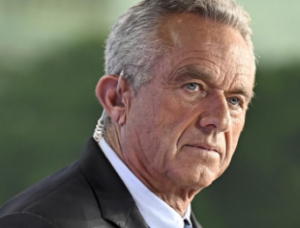A New Era in Public Health? The Appointment of Robert F. Kennedy Jr. as Health Secretary

In a move that has stirred considerable conversation across the political spectrum, Robert F. Kennedy Jr. has been appointed as the Secretary of Health. Securing his position with a narrow 52-48 Senate vote, Kennedy has emerged at the center of a significant transition in public health leadership. Interestingly, this vote reflected party lines, with a notable exception being Mitch McConnell, who seemingly broke ranks during the proceedings, calling his support for Kennedy into question. As the dust settles, it seems many are scrambling to reassess their positions before what some are labeling a ‘war on public health’ commences.
One eye-catching development came just days before Kennedy’s appointment: the sudden resignation of Dr. Lawrence A. Tabak, the principal deputy director at the National Institutes of Health (NIH). Tabak, who served as Anthony Fauci’s right hand during the COVID-19 pandemic, had been subject to scrutiny in a GOP investigation into the origins of the virus. His involvement in what appeared to be a coordinated effort to downplay the lab-origin theory has left many wondering about the motives behind his swift exit.
As reported by Jeremy Berg, the former director of NIH’s National Institute of General Medical Sciences, Tabak’s role in the NIH was laden with responsibility yet rife with challenges. Berg’s striking comment about Tabak’s history in the organization hints at a messy legacy: “Larry has shoveled so much sh— over the years that he would have been well qualified to work behind the elephants in an old circus.” Such vivid imagery encapsulates the turmoil that has defined the NIH’s public narrative during the pandemic.
The media response to Kennedy’s appointment has been swift and largely negative. Outlets like NBC News have labeled him a "high-profile anti-vaccine activist" notorious for spreading misinformation. A narrative is forming that paints Kennedy as a potential threat to vital healthcare programs like Medicare and Medicaid. However, this perspective fails to address the broader implications of his health policy agenda, which aims at reforming standards and increasing oversight over powerful industries like Big Pharma.
Kennedy’s initiative, Make America Healthy Again, positions itself as a counterforce against not just pharmaceutical giants but also food manufacturers. His desire to implement stricter nutritional guidelines could represent a significant paradigm shift in how Americans view health and wellness. He stated, “I look forward to working with the more than 80,000 employees at HHS to free the agencies from the smothering cloud of corporate capture so they can pursue their mission to make Americans once again the healthiest people on Earth.”
This appointment signals a demand for change that resonates with many Americans. Despite substantial financial backing spent to impede Kennedy’s entry into the Department of Health and Human Services (HHS), the support for his vision appears resilient. As the mainstream media brands him a ‘conspiracy theorist,’ grassroots support reveals an appetite for an alternative approach to public health and corporate influence.
Mitch McConnell’s conflicts of interest also cannot be overlooked. It’s worth highlighting that numerous pharmaceutical companies, including Pfizer, have been linked to substantial donations to McConnell’s campaign efforts. Pfizer’s $1 million contribution to the Kentucky Republican Party raises questions about the potential impact of financial interests on health policy and the responsibilities held by public officials. Other established players like AbbVie, Eli Lilly, and Bristol-Myers Squibb have also contributed to McConnell’s past campaigns, further intertwining political and corporate interests in the landscape of American healthcare.
At Extreme Investor Network, we believe that such appointments can pave the way for transformative discussions about public health and corporate influence in the sector. As Kennedy assumes his role, the focus should shift not just to the challenges he may face but also to the solutions he proposes for creating a healthier America. Are we witnessing the dawn of a new era in public health, or merely another chapter in the ongoing saga of political maneuvering in the face of corporate dominance?
Join us as we explore the unfolding narrative and its implications for the American public health system.
Stay informed. Stay invested.

